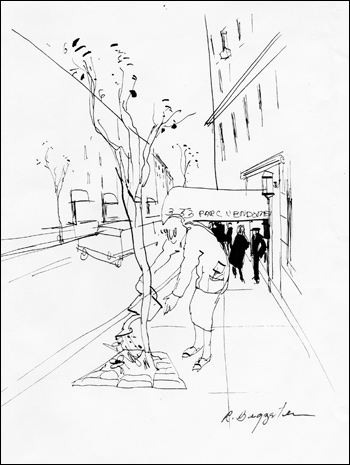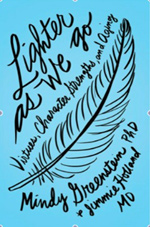

|
|
Poetics of Aging
People reach a certain age in life when they tend to reassess its meaning and importance. They may be reaching for a certain validity…struggling with the increasing loss of loved ones which pounds at the core of their being...feeling diminished by younger people who see them as a burden instead of an asset…wanting the end-stage of their life to matter more than it seems to, to themselves and those around them…needing love more than they used to and the constancy of those they most love and admire. Whatever the journey, poetry can sometimes help lift the spirit, offering a sort of music for the soul that can be reaffirming. |
||||||||||
| THE ARTISTRY OF RUTH BUGZESTER
Ruth Bugzester (1924-2010) was an artist of high accomplishment, a refined and gifted illustrator probably best known for her portraits. Little is known publicly about Ms. Bugzester’s life, although she worked for years across from the Parc Vendome on Manhattan’s West 56th Street. From her window, she captured a neighbor’s daily ritual of nurturing a tree outside the Parc Vendome apartments. One day, she knocked on this neighbor’s door—as the story is told—and presented this illustration, here titled The Watering Can, as a gift to her muse– in appreciation for the inspiring sight that so often met her glance from the window. |
|
||||
“We want to see, and yet we are afraid to see. This is the perceptible threshold of all knowledge, the threshold upon which the interest wavers, falters, then returns….the great function of poetry, is to give us back the situations of our dreams.” |
Excerpt from Morituri Salutamus Age is opportunity no less |
Excerpt from Mezzo Cammin Half of my life is gone, and I have let [Henry Wadsworth Longfellow]
|
Thought Satellite I think of poems as a series [Chase Twichell, from Horses Where the Answers
|
And life is too much like a pathless wood [Robert Frost] |
Do Not Go Gentle Into That Good Night Do not go gentle into that good night, |
Stanzas from Rabbi Ben Ezra Grow old along with me! Youth ended, I shall try So, still within this life, Ay, note that Potter's wheel, [Robert Browning (4 stanzas from an epic poem of 32 stanzas)] |
Sonnet X, from Huntsman, What Quarry? Upon this age, that never speaks its mind, |
Beautiful Old Age It ought to be lovely to be old Soothing, old people should be, like apples And a girl should say: And a young man should think: By Jove [D.H.Lawrence] |
To the Reader: Twilight Whenever I look |
How Zen Ruins Poets Before I knew that mind Then a question arose in me: |
The Fifth Precept Do not cloud the mind, says the Fifth Precept. Thunderstorms elate me; my mind I asked a teacher how a cloud should sit. *Poet’s note: Bipolar II characteristics (in italic) have been lifted [Chase Twichell] |
“Hope” is the thing with feathers “Hope” is the thing with feathers [Emily Dickinson] |
Lighter As We Go: Virtues, Character Strengths, and Aging is about living life fully and the joys and challenges of aging. It is a deeply researched book, written in a conversational manner. It hopes to inspire understanding, appreciation, and intergenerational dialogue. The two medical pros who wrote it are kind and gentle in their approach, show extraordinary sensitivity to women, and share their own wisdom and life experiences with generosity and trust. Mindy Greenstein is a 55-year-old clinical psychologist, psycho-oncologist, and consultant in geriatric psychiatry at Sloan Kettering Cancer Center (herself a cancer survivor). Jimmie Holland holds the Wayne E. Chapman Chair in Psychiatric Oncology at Sloan Kettering, founded the geriatric psychiatry group at the Department of Psychiatry and Behavioral Sciences at Sloan Kettering Cancer Center, and is Professor of Psychiatry at Weill Cornell Medical College of Cornell University. Dr. Holland founded the field of psycho-oncology and helped develop this field around the world. At age 85, she still practices psychiatry at Sloan Kettering. Reinforcing and informing the work of Greenstein and Holland are dozens of individuals, members of a Vintage Book Club with whom the authors interact, a large array of interviewees and case studies, and even family members. Poetry and philosophy have an important role in Lighter As We Go: Cicero’s wisdom from 2000 years ago (he is also featured at the top of this page) and that of A.A. Milne, Maurice Sendak, Art Buchwald, William May, and Judith Vorst among many others. Near the beginning of Lighter As We Go is this treasure from a chapter on the virtue of transcendence:
Piglet sidled up to Pooh from behind. “Pooh?” he whispered. “Yes, Piglet?” “Nothing,” said Piglet, taking Pooh’s hand. "I just wanted to be sure of you.” Towards the end of the book, Cicero is quoted (as he often is in Lighter as We Go): “Old age is not as bad as you think it will be, death is not something to fear so much, and, above all, do not let either of them get in the way of living.” Some of the facts of Lighter as We Go are surprising–for example the discussion about the extensive U-Bend research that has been done over the years. This research examines the well-being of people at different ages. Contrary to popular belief, the greatest sense of well-being across a lifetime is among young people and the elderly, two parts of the age spectrum that “travel most lightly.” The title, Lighter As We Go, is based on an understanding that we see things in greater perspective as we grow older, that we learn to “travel lighter” as we go. Among other things, we have greater wisdom and awareness, deeper knowledge of the world, fuller appreciation of love and the importance of caring, and an easier self confidence that makes us feel more secure within ourselves. Readers of the Purple Scooter Poetry website, and of this Poetics of Aging page in particular, will like Lighter As We Go (available from Amazon.com) – it tells us of the knowledge and wisdom we ourselves have, of habits we can nurture to live well in older age (or at any age), is sometimes sobering but always uplifting and positive. It is an affirmation of life, a celebration of life, poetic in a unique way. It will often make you smile! You may find yourself underlining passages throughout the book because they will resonate so much with your own experience. See www.theartoflivinglighter.com for more information about U-Bend research and about authors Mindy Greenstein and Jimmie Holland.
|
Have a heart that never hardens, Beautiful young people are accidents of nature, Aging is not lost youth but a new stage Those who love deeply never grow old; they may die of old age, Nothing is inherently and invincibly young except spirit. And spirit can enter a human being perhaps better in the quiet of old age and dwell there more undisturbed than in the turmoil of adventure.
|
The Poetics of Aging, a September 2013 blog posting by Gail Spangenberg, editor of the Purple Scooter Poetry website: www.purplescooterpoetry.org/blog . “What Are Friends For? A Longer Life,” by Tara Parker-Pope, New York Times, Health Section, April 2009. http://www.nytimes.com/2009/04/21/health/21well.html?_r=0 The Art of Aging: A Doctor’s Prescription for Well-being, by Sherwin Nuland, 2008. Available in paperback and other formats from Amazon.com: “Reflecting the wisdom of a long lifetime, The Art of Aging is a work of luminous insight, unflinching candor, and profound compassion.” It depicts aging almost as an art form in itself. “Age is No Obstacle to Love, or Adventure,” Fashion & Style, New York Times, September 2013 -- http://cas.umkc.edu/casww/sa/Relationships.htm |
Leave a Comment |
E-Mail List |
Policy |


